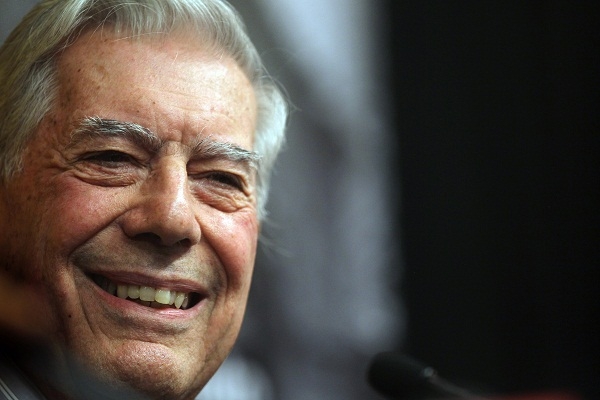Now we’ve all had our fill of bunting, bladders and BBC-bashing, it’s time to turn our minds to more high-minded pursuits, starting with a long overdue glance at the weekend’s book pages.
And you can’t get higher minded than a Nobel Laureate. 74-year-old Peruvian novelist, and ex-presidential candidate, Mario Vargas Llosa has a new book out. Called The Dream of the Celt, it’s about Sir Roger Casement, the Irish-born diplomat who was executed for treason in 1916.
When the Telegraph’s Nicholas Shakespeare asked Llosa to explain his motive for writing, he replied: ‘In my case, literature is a kind of revenge. It’s something that gives me what real life can’t give me – all the adventures, all the pleasures, all the suffering.’
Thoughts of suffering, and revenge, must have been forefront of his mind if he happened to read Roy Foster’s Times review of The Dream of the Celt. ‘It is…surprising’ said Foster ‘to find Vargas Llosa’s novel…so faithfully adopting the form of hagiography. It is even more surprising, given its immensely distinguished author, to find it so wooden, creaky and unrelievedly dull.’ Its style, thought Foster, hovered somewhere ‘between A Child’s History of the Congo and a Mills & Boon romance.’ Peter Kemp in the Sunday Times agreed: ‘Despite subject matter that is vibrant with potential,’ said Peter Kemp, ‘this novel largely reads like an exercise in anaesthesia.’ His crimes? Too much exposition, repetition and ‘drowse-inducing’ lists.
Llosa can draw a crumb of comfort from Jason Winter’s much more generous Independent review, which concluded: ‘Had Vargas Llosa not won the Nobel the month this novel appeared in Spanish, it may have won the prize for him.’ Ian Thomson in the Telegraph thought the ‘passionate if occasionally patchy novel will help to rehabilitate a maligned man.’
Other distinguished names with books out include Paul Theroux whose novel The Lower River tells the story of a 62-year-old American man who returns to Malawi, where he’d taught in the sixties. It is not, by all accounts, an uplifting read, although according to Christopher Hope in the Guardian, ‘One of the many admirable things…is that Theroux’s affection for the country never slackens, even as he savages the lies, theft and thuggery of local leaders, and the iron-hearted do-goodery of foreign aid agencies, which have rendered those who were once poor but viable poorer, unhappier and more dependent than ever.’ Writing in the Sunday Times, Leo Robson was more negative: ‘Theroux fails to animate Hock’s sense of himself and of his environment, and to evoke the states (bliss, fear, exhaustion) he so often names, but the novel’s central problem is that its scenario ties realism about the present to romanticism about the past.’
Reviews have been better for Richard Ford’s new novel, Canada, about the young son of two inept bank robbers. Philip Hensher called it ‘magisterial, peculiar, riveting’ in his Independent review, while John Banville, writing in the Guardian, thought it a ‘superlatively good book, richly imagined and beautifully fashioned,’, noting how it ‘catches movingly the grinding loneliness at the heart of American life – of life anywhere.’ Banville said he was ‘tempted to acclaim it a masterpiece.’
On the non-fiction side of things, Antony Beevor has written yet another book about the Second World War, called simply The Second World War – a title you imagine was meant to be provocative in its definitiveness. So how does Beevor’s new book differ from countless other narrative histories of the war? As Tony Barber in the Financial Times explains, he opens his story ‘not with the invasion of Poland but with a battle in east Asia to which Europeans paid little attention in the summer of 1939: the crushing Soviet victory over Japanese forces at Khalkin Gol on the Mongolian border. This unusual perspective enables Beevor to throw immediate light on the geopolitics of the European and Pacific wars.’ Although it was ‘not without it flaws’, Barber thought the book ‘an example of intelligent, lively historical writing at its best.’ In the Independent, Roger Moorhouse called it ‘splendid…erudite…excellent’ but found it ‘hard to escape the impression that, in tackling such a vast subject, Beevor has been obliged to sacrifice too much of the very aspect that had become his stylistic trademark: the telling anecdote, the poignant aside, the illuminating vignette.’ The result, felt Moorhouse, was a book that ‘for all its excellence – appears to lack some of the pizzazz of his earlier offerings.’
Anna Baddeley
Across the literary pages: Post-Jubilee special






Comments